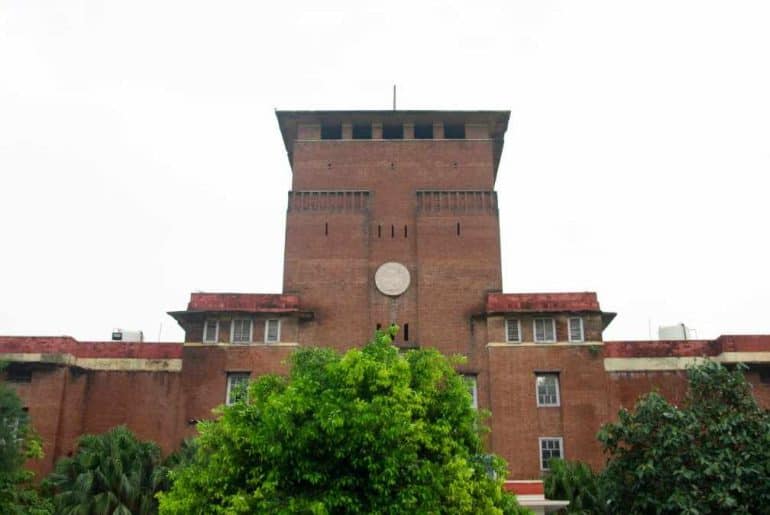We spoke to Shivam Maurya, a first-year B.Com (Hons.) student at Hindu College, contesting for the post of president from DISHA Students’ Organization, ahead of the DUSU elections scheduled for September 27, 2024.
Question: What in your individual capacity motivated you to contest for election?
Shivam: We come from very far-off to the nation’s biggest university, it is however not how people say it is. We are not being provided with hostels. Looking at fees, you think it’s low but when you have to pay it. My own fee is Rs. 26,870; it’s too much for a middle-class student.
Question: What do you see as the biggest challenge that students face today?
Shivam: The biggest challenge is anti-student policies. Policies like NEP, FYUP teach students skill-based knowledge so they can do some fixed work for fixed industries. These are designed in a way that disallows lower-class people from coming forward. Seen this way, the most-backward can never make it to the front.
Question: You talk of “merging the student-youth movement with the struggle of the working masses” in your manifesto. How do you interpret this?
Shivam: Like we have students and working-class individuals, this statement is not for the elite.
Question: Also, what is a ‘common minimum programme’?
Shivam: Common minimum programme reflects common interests and problems of students like fee hikes, hostel accommodation, and (un)employment.
Question: Your manifesto repeatedly refers to the ‘common student’. What is this common student in your understanding? Is every student in DU a common student?
Shivam: At a basic level, every student is a common student. Several students, however, take admission [in DU] to spread propaganda for selfish purposes. Those are in no way common.
Question: The image of Bhagat Singh is your ideological representative, ABVP uses that too. How is it different?
Shivam: For us, Bhagat Singh’s ideology is that of equal education, opportunity, and [equal] treatment of everyone. But as you say ABVP uses Bhagat Singh’s iconography as well but – in a false manner and they throw their pamphlets over roads and use Bhagat Singh to save themselves[for their own political benefit].
Question: How does not being aligned to any party help you during elections? One can see this as a weak ideological position but, how is it a strength?
Shivam: We have to understand the difference between a political party and a student organisation. If you are aligned to a political party then you represent the party rather than students, like ABVP and NSUI do. Whereas, DISHA represents only students and you think of it as a weakness but it is not a weakness.
Question: SFI and AISA have come into an alliance for left-unity, DISHA can also be ideologically interpreted as a left party. Did you approach them for an alliance?
Shivam: We do not feel it should be ideologically-run as every student who aligns themselves with our common minimum programme is welcome to join DISHA. If we only take someone from a fixed ideology then students of different ideologies are excluded.
Question: But the way you claim that ABVP-NSUI have a politics of money and muscle, but even their politics come from ideas that are accepted by the masses who elect them to power. Your manifesto claims DISHA has no ideology. Isn’t it a weakness that you don’t have an ideology?
Shivam: No, it does not mean that we’ll let anyone join the organisation. If someone promotes casteism or hooliganism, we won’t keep them in the organisation as they are violating our common minimum programme.
Question: Several members of DISHA have often been seen indulging in online debates using heavy terms that might not be accessible to marginalized students who are not familiar with Marxist discourse. This is contrary to your manifesto that states you don’t have an ideology. How far do you think these debates can be stretched in order for them to not reduce to in-fighting?
Shivam: What members of DISHA do, is their own matter. The organisation is isolated from this.
Question: So, your members’ actions are separate from the organisation?
Shivam: We are concerned as to what they do at the level of the organisation. We can’t interfere in their personal lives.
Question: How does your organisation plan to include students from gender, religious, and caste minorities, LGBTQIIA+ students, and students from economically weaker sections?
Shivam: We see them all equally. We oppose their oppression but we do not oppress them. They all can come with us and fight and we are with them too.
Question: Systems of power oppress them. For instance, the recent Delhi HC directive about ensuring 50 per cent representation of women in DUSU counters gender oppression. Is DISHA doing anything to ensure this representation and inclusivity?
Shivam: It’s nothing like that. It’s not necessary that only women can understand women’s issues or only Dalits can understand Dalit students’ issues. From time to time, our organisation protests or engages in struggles whenever necessary. As students see us and recognise our struggles, they’ll try to join us.
Question: The DUSU candidates of DISHA are not as publicly visible as other candidates are. This makes mobilization of students difficult as candidates are the face of any organisation. Why so?
Shivam: We are trying our best but we are unable to gather such a large outreach.
Image Credits: Devesh for DU Beat
Read Also: Interview with Dr. Abha Dev Habib
Interviewed by Bhavana and Vedant





Comments are closed.